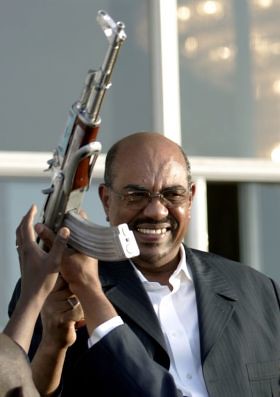
Sudan President Omar Hassan al-Bashir says the government will take military actions if efforts are made to break off the Kordofan areas of the Central African state. The south of the country is scheduled to secede in July 2011 despite internal conflicts., a photo by Pan-African News Wire File Photos on Flickr.
Bashir says Abyei belongs to the north
Sudan president says his forces will not withdraw from disputed region, escalating fears of fresh north-south conflict
Last Modified: 24 May 2011 22:17
Al Jazeera's Sherine Tadros reports on how the north's takeover of Abyei is escalating tensions with the south
Omar Hassan al-Bashir, the president of Sudan, has said that Abyei belongs to the north and that his forces will not withdraw from the disputed region.
"Abyei is northern Sudanese land," Bashir said in a speech in the capital Khartoum on Tuesday. "We will not withdraw from it."
He said he had given the green light to the northern army to respond to any possible "provocation" by the army of south Sudan which also claims the region and plans to become independent on July 9.
The latest remarks marked a dramatic shift from his earlier statement that a "peaceful resolution" for Abyei would be found.
Northern forces took control of Abyei by moving tanks into the main settlement on the weekend after weeks of tensions, forcing tens of thousands to flee and sparking an international outcry.
Southern officials on Monday accused the north of trying to provoke a new civil war. Sudan's last north-south civil war ended in a 2005 peace deal that allowed southerners to vote overwhelmingly for independence in a referendum in January.
The deal also promised Abyei residents their own referendum over whether to join the north or south, but that never took place as neither side could agree who was qualified to vote.
Fleeing conflict
"We have a rough estimate of 15,000 people displaced in and around Agok [in South Sudan]," Elisabeth Byrs, a spokeswoman for the UN Office for the Co-ordination of Humanitarian Affairs said earlier on Tuesday.
Khartoum's capture of Abyei set off violent chaos in the region, with parts of the Abyei town being set on fire by looters.
Peacekeepers belonging to UNMIS, the UN mission in Sudan, said on Monday that the burning and looting was perpetrated "by armed elements" but it was not clear whether they were from the north or the south.
The US special envoy to the country has said Washington would not drop Sudan from a terrorism list if it continued occupying the oil-rich district.
Princeton Lyman said the "occupation" of Abyei by northern troops was "an extremely disproportionate response by the government of Sudan" to an attack on a UN convoy escorting the troops last week.
But Lyman added that there was still hope of the two sides resolving the crisis. "I am optimistic in this sense: These two entities - Sudan and soon-to-be independent South Sudan - need each other," he told Al Jazeera.
"They have to collaborate for their own good, and while we're now facing a major crisis in Abyei, we're hopeful that the leadership, particularly president al-Bashir [in the north] and vice-president Kiir [in the south] will re-establish the spirit that they talked about ..."
Sudanese government officials in the north said their troops moved into Abyei - inhabited by two tribes backed by the south and north respectively - to drive out the south's Sudan People's Liberation Army (SPLA), who they said had been occupying Abyei since last December.
The nomadic Misseriya tribe, which is backed by the north, grazes its cattle in Abyei while the Dinka Ng'ok, backed by the south, lives in Abyei year round.
Source: Al Jazeera and agencies
No comments:
Post a Comment